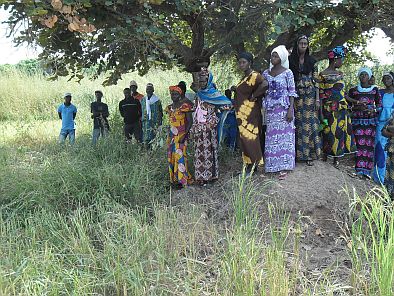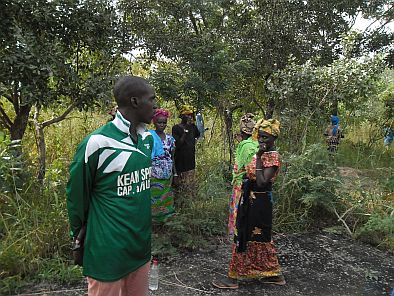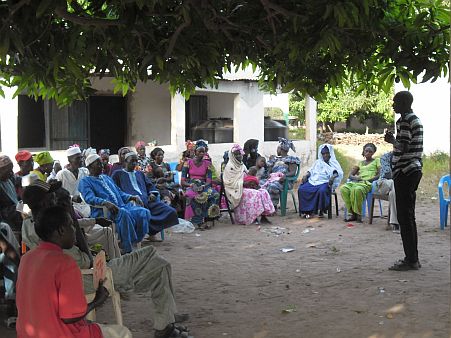Three project proposals are being developed since November and are expected to be completed in December, 2016. All proposals are being developed in collaboration will partners. All efforts are aimed to mobilize funds for the implementation of the plan programmes.
In response to a call for proposal from UNDP /GEF Small grants programme, GCWP submitted late in 2015 a project proposal for Stakeholder Awareness and Capacity Building for Two Hundred and Forty Farmers on Water Security, Climate Change Resilient Development and Ecosystem Management in two administrative regions of The Gambia: Kiang West (Lower River Region), Jokadou and Illiassa districts (North Bank Region), The Gambia.
Approval for granting an amount of Twenty-Five Thousand United States Dollars was provided. A Memorandum of Agreement was signed between the UNDP Resident representative and GCWP represented by the National Coordinator, in October, 2016. Fifty per cent (50%) of the total grant was provided to GCWP in October, 2016, and project activities implementation kick off in November, 2016.  The aim is to promote Water security and Climate Resilient development in the Gambia.
The aim is to promote Water security and Climate Resilient development in the Gambia.
Project implementation
Upon receiving funds from UNDP/GEF, project implementation kicks off. Contacts with the Village Development Committees (VDC) to schedule dates for visiting three of the six beneficiary communities for consultations and planning meetings were arranged with the three communities of Battelling, Tankular and Illiassa. Visits were made to these communities, where open community meetings were facilitated, attendance in each of the communities was satisfactory. Stakeholders were sensitized and mobilized to raise awareness and active participation. Details of the project and a Memorandum of Understanding were discussed and agreed upon. Chairpersons of the Village Development Committees signed on behalf of their communities and the National Coordinator signed on behalf of the GCWP. Meetings in each of the communities were attended by over one hundred people, males and females.
 Preparation of training tools and materials for the capacity building training workshops to be conducted in the three communities followed suit. The required materials and equipment were procured and stored. Training tools were also prepared.
Preparation of training tools and materials for the capacity building training workshops to be conducted in the three communities followed suit. The required materials and equipment were procured and stored. Training tools were also prepared.
Capacity building trainings workshop were conducted in Battelling from the 7th to the 11th November 2016 including a field visit to the two demonstration sites selected by the community. Likewise, the same was conducted in Tankular from the 14th to 18th including site visits.
Linking with populations daily life
The training was on popular education bases where everyone is a trainer and a learner. Local knowledge and experience was inculcated in the programme in order to strengthen and add value to the local capacity. The methods applied were brainstorming, presentations, storytelling, drama and video shows, observations, case studies and practical visits to demonstration sites. Questions and answers sessions were also part of the sessions so as to determine participant’s level of understanding. End of training evaluations were made through interviews. Participants were really enthusiastic about the training and all pledge that they will make the best use of the knowledge, skills and techniques acquired from the training at individual, community and by extension at district, regional and country levels. All pledge to participate actively on the development and preservation of the demonstration plots.
The topics were on background to IWRM, principles and practices, water security, critical challenges, ecosystem management, climate change resilient development among others. A Field visit to the two identified demonstration sites was facilitated in both Battelling and Tankular and pictures were taken to show current situation and topography of the sites. All the sites cover an area of five hectares.
In Battelling, twenty males and twenty females attended the training, making a total of forty. In Tankular, nineteen males and twenty-one females attended the training, making a total of forty. The same activities are to be carried out in Illiassa in the soonest possible time. All as part of the first instalment payment of fifty percent from the amount approved for funding from UNDP/GEF Small Grant Programme.

It is expected that planned activities are carried out in the other three communities upon receipt of the second instalment of forty percent when the first three are satisfactorily completed.
Main results and outputs
The results and outputs of this action can be presented as follows:
- Eighty farmers (39 males and 41 females) from Battelling and Tankular are now equipped with relevant knowledge, skills and techniques on the functions and management of ecosystems both terrestrial and aquatic;
- The 80 participants have a clear understanding on watershed/wetland ecosystems, terrestrial ecosystems, their basic components;
- 80 Participants enabled to identify different goods and services/functions and effective management of ecosystems;
- 80 Participants attain a comprehensive learning means on factors and elements of changes of ecosystems.
The Eighty farmers (39 males and 41 females) from the two communities are prepared and equipped with relevant knowledge, skills and techniques to address urgent and significant water stress, climate threats and threats to the ecosystems through actions that will deliver immediate water security and climate change adaptation and ecosystem management benefits. These actions will contribute to building and sustaining local and national water security and mitigation and adaptive capacities among Eighty farmers in two rural communities.
They are expected to continue to raise awareness and build foundations for maximizing short and long-term water security, climate change mitigation and adaptation, and ecosystem management benefits in the two communities. The feeling is that the threats and impacts of climate change on water resources, and its potential adverse effects on society, economy, environment and ecosystems are understood, and greater understanding of the potential threats being faced in the respective communities.
Participatory and self-sustaining integrated water security and climate change mitigation and adaptation processes are established in two communities, providing guidance and information for future water, ecosystems and climate resilient management in their districts, regions and The Gambia.
Two pilot areas are identified in each of the two communities (one terrestrial and one aquatic) for use as sample demonstration sites.
GCWP continues to pursue its activities on cost and no cost activities on advocacy, capacity building and information sharing. Consultations, sensitisation and mobilisation activities for raising awareness and participation at individual institutional informal groups at various levels are on-going.
